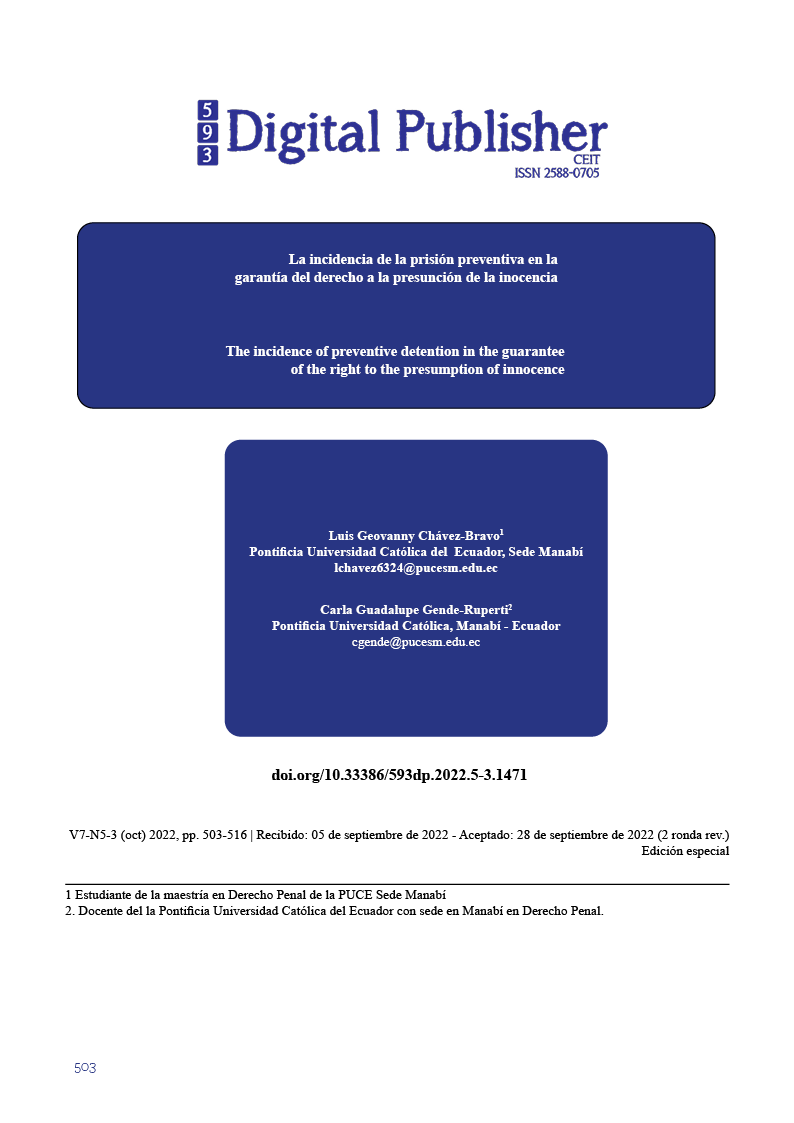The incidence of preventive detention in the guarantee of the right to the presumption of innocence
Main Article Content
Abstract
The content of this scientific review article has its origin in the consequences of the application of preventive detention, compared to the right to the presumption of innocence. The number of cases that are seen daily in Ecuador, in which suspects are deprived of liberty with the measure of preventive detention and, later, are acquitted by resolution, have consequences that cause affectations (economic, psychological, etc.) not only to the subject, but to the State.
Therefore, in order to reach a criterion that discussed the above, the following topics have been developed: The judicial system in Ecuador, it is important to know high benefits are the mechanisms that are used in the Ecuadorian penal system to guarantee the rights and procedures , and to impart justice; Precautionary measures, whose main function is to avoid the threat against constitutional rights or human rights recognized in the Constitution of the Republic of Ecuador, as well as in international treaties; Preventive detention, constituted as a precautionary measure, whose purpose is to guarantee the appearance of the suspect; and, finally, reference is made to the Right to the presumption of innocence, a fundamental right, which the Constitution of the Republic of Ecuador, in accordance with other international norms, must protect at all costs, without allowing other rights to be violated, as is the right to freedom.
The results of this research have allowed us to develop a discussion on the issue raised, which, ultimately, leads us to infer that the right to freedom is restricted by the rules that govern the behavior of the human being; that preventive detention is applied mechanically in the justice system, without observing other details; and, that the guarantee of the right to the presumption of innocence is not effective in Ecuador.
Downloads
Article Details

This work is licensed under a Creative Commons Attribution-NonCommercial-ShareAlike 4.0 International License.
1. Derechos de autor
Las obras que se publican en 593 Digital Publisher CEIT están sujetas a los siguientes términos:
1.1. 593 Digital Publisher CEIT, conserva los derechos patrimoniales (copyright) de las obras publicadas, favorece y permite la reutilización de las mismas bajo la licencia Licencia Creative Commons 4.0 de Reconocimiento-NoComercial-CompartirIgual 4.0, por lo cual se pueden copiar, usar, difundir, transmitir y exponer públicamente, siempre que:
1.1.a. Se cite la autoría y fuente original de su publicación (revista, editorial, URL).
1.1.b. No se usen para fines comerciales u onerosos.
1.1.c. Se mencione la existencia y especificaciones de esta licencia de uso.
References
Arias Coronado, J. E. (2014). “La Prisión Preventiva como Medida Cautelar Personal de Excepción. dspace. https://dspace.uniandes.edu.ec/bitstream/123456789/2086/1/TUIAB016-2015.pdf
Arias, M. A. (2006). La detención en firme (1.a ed.). Cámara Ecuatoriana del Libro - Núcleo de Pichincha.
Asamblea Constituyente Francesa. (1979, 26 agosto). Declaración de los Derechos del Hombre y del Ciudadano de 1789. Recuperado 14 de septiembre de 2022, de https://www.psi.uba.ar/academica/carrerasdegrado/psicologia/sitios_catedras/obligatorias/723_etica2/material/normativas/declaracion_derechos_hombre_ciudadano_1789.pdf
Asencio Mellado, J. M. (1986). La prisión provisional (Tesis doctoral de la Universidad de Alicante). Rua.ua.es. https://rua.ua.es/dspace/bitstream/10045/3483/1/Asencio-Mellado-Jose-Maria-01.pdf
Binder, A. M. (2000). Introducción Al Derecho Procesal Penal (2.a ed.). Ad-Hoc.
Campbell, J. C. (2007, 1 enero). Garantías constitucionales del debido proceso penal. Presunción de inocencia | Campbell | Anuario de Derecho Constitucional Latinoamericano. Unam. https://revistas-colaboracion.juridicas.unam.mx/index.php/anuario-derecho-constitucional/article/view/30379/27419
Clairá, J. A. (2013). Derecho Procesal Penal (1.a ed., Vol. 1). Culzoni. https://issuu.com/bujazhaaugusto/docs/clari__olmedo__jorge_-_derecho_proc_f3341efe85dcdc
Código Orgánico Integral Penal. (2021). Quito.
Comisión Interamericana de Derechos Humanos. (2013). Informe sobre el uso de la Prisión Preventiva en las Américas. Recuperado de http://www.oas.org/es/cidh/ppl/informes/pdfs/informe-pp-2013-es.pdf
Comisión Interamericana de Derechos Humanos. (2017). Medidas para reducir la prisión preventiva: informe sobre medidas para reducir el uso de la prisión preventiva en las América. OEA/Ser.L/V/II.163 Doc. 105
Comisión Interamericana de Derechos Humanos. (2022). Sobre las Medidas Cautelares. OEA. Recuperado 29 de agosto de 2022, de https://www.oas.org/es/CIDH/jsForm/?File=/es/cidh/decisiones/mc/sobre-cautelares.asp#:~:text=Una%20medida%20cautelar%20es%20un,de%20sufrir%20un%20da%C3%B1o%20irreparable.
Comunicación Patagónica. (2007, 20 febrero). Comunicación Patagónica. http://comunicacionpatagonica.blogspot.com/2007_02_01archive.html
Constitución de la República del Ecuador. (2008). Constitución de la República del Ecuador. Montecristi.
Convención Americana sobre Derechos Humanos (Pacto de San José). (1969). ASAMBLEA LEGISLATIVA DE LA REPUBLICA DE COSTA RICA. Recuperado 14 de septiembre de 2022, de https://www.corteidh.or.cr/tablas/17229a.pdf
Ecuador. Asamblea Nacional Constituyente. (2008). Constitución Política de la República del Ecuador. Registro Oficial 449. http://www.asambleanacional.gov.ec/documentos/constitucion_de_bolsillo.pdf
Estatuto de Roma de la Corte Penal Internacional. (1998). Naciones Unidas. Recuperado 14 de septiembre de 2022, de https://www.icrc.org/es/doc/resources/documents/misc/treaty-1998-icc-5tdm58.htm
Gómez, Roxana. (2018). La prisión preventiva desde el enfoque de los derechos humanos. Tesis de grado de la Universidad Católica de Guayaquil. http://201.159.223.180/bitstream/3317/11800/1/T-UCSG-PRE-JUR-DER-MD-215.pdf
Hermida, Á. M. S. (2002). El nuevo proceso penal del menor. Ediciones de la Universidad de Castilla-La Mancha.
Hernández, J. A. (2011). El Proceso Penal Mexicano. El Sótano. Recuperado 14 de septiembre de 2022, de https://www.elsotano.com/libro/proceso-penal-mexicano-el_10122180
Loor, Y. M. (2021, 13 septiembre). PRINCIPIO DE INOCENCIA - Derecho Ecuador. Derecho Ecuador -. Recuperado 14 de septiembre de 2022, de https://derechoecuador.com/principio-de-inocencia/
Luz Yunes, A. (2021, 13 septiembre). El Derecho a la Libertad Personal - Derecho Ecuador. Derecho Ecuador -. https://derechoecuador.com/el-derecho-a-la-libertad-personal/#:%7E:text=%E2%80%9CNadie%20puede%20ser%20privado%20de,leyes%20dictadas%20conforme%20a%20ellas%E2%80%9D.
Menéndez, T. (2021, 21 diciembre). La prisión preventiva, con nuevas reglas para su aplicación en Ecuador. Primicias. Recuperado 14 de septiembre de 2022, de https://www.primicias.ec/noticias/lo-ultimo/nuevas-reglas-prision-preventiva-ecuador/
Rufialnchas, J. R. (2003). Cárcel y encarcelamiento de la Grecia clásica en castigo y reclusión en el mundo antiguo. Madrid, España: Emerita.
Salazar, J. G. (2015). La presunción de inocencia y prisión preventiva en el proceso penal ecuatoriano. repositorio. uasb. Recuperado 14 de septiembre de 2022, de https://repositorio.uasb.edu.ec/bitstream/10644/4867/1/T1879-MDP-Salazar-La%20presuncion.pdf
Sarabia, R. G. H. (2021, 15 mayo). La prisión preventiva: breve estudio en Argentina y Ecuador. Tratamiento en el Sistema Interamericano de Derechos Humanos | Haro Sarabia | Revista Metropolitana de Ciencias Aplicadas. Revista Metropolitana. Recuperado 29 de agosto de 2022, de https://remca.umet.edu.ec/index.php/REMCA/article/view/389/409
Terán Suárez, R. J. L. (2020). medidas cautelares constitucionales en Ecuador. Crítica y Derecho, Revista Jurídica., 1(2), 1–13. https://doi.org/10.29166/cyd.v1i2.2807
Vidal, G. (2022, 5 abril). La presunción de inocencia en el Derecho Penal. Gerson Vidal. Recuperado 5 de septiembre de 2022, de https://www.gersonvidal.com/blog/presuncion-inocencia/
Zapatier Córdova, P. S. (2020). La aplicación de la prisión preventiva y el principio de presunción de inocencia ((Tesis de Maestría-Universidad Andina Simón Bolívar)). https://repositorio.uasb.edu.ec/bitstream/10644/7634/1/T3321-MDPE-Zapatier-La%20aplicacion.pdf


